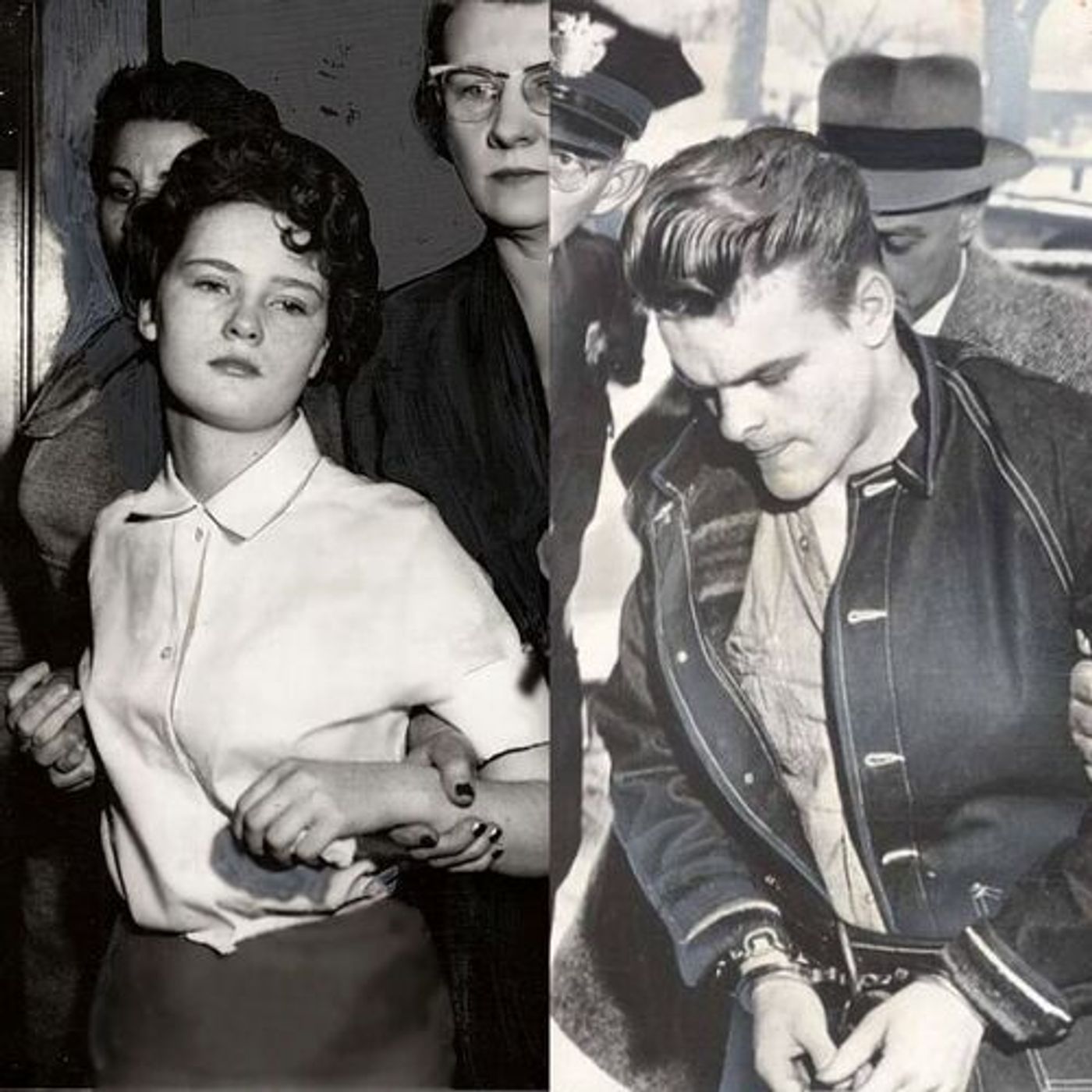In the 1950s, 19-year-old Charles Starkweather went on a killing spree, bringing his 14-year-old girlfriend with him.
According to the FBI, there is one key difference between a serial killer and a spree killer: while serial killers have a cooling-off period between their crimes, spree killers typically continue to kill over a short period of time.
Criminal psychologists and investigators have struggled to understand the psychology behind spree killers - but for many criminals, details about their childhoods can pull back the curtain… providing an insight into the horrific crimes they commit as adults. For Charles Starkweather, born in Nebraska in 1938, his resentment of other people was the motivator for his crimes - and it began to develop at a young age.Charles was an unhappy child. He had a birth defect that affected the shape of his legs, and claimed that his classmates bullied him because of a speech impediment. When he became a teenager, he fell in love with exercising - and now that he was strong enough, he turned the tables, and started threatening and beating up his bullies.
“He could be the kindest person you’ve ever seen,” said one of his school friends. “He’d do anything for you if he liked you. He was a hell of a lot of fun to be around, too. Everything was just one big joke to him…but he had this other side. He could be mean as hell. Cruel. If he saw some poor guy on the street who was bigger than he was, better looking or better dressed, he’d try to take the poor bastard down to his size.”
Charles’ classmates weren’t the only people to notice that he had a dark side. By the time he reached his late teens, his family was so terrified of his fits of rage that they had started avoiding him. In his senior year in 1956, Charles dropped out of school and started working at a newspaper warehouse. At around this time, Charles was introduced to a girl who immediately stole his heart. Her name was Caril Ann Fugate…and she was only thirteen years old. Charles was eighteen.
Charles’ job at the warehouse was close to where Caril went to school, so he started going to visit her after her classes were finished. Because Caril was, again, only thirteen, she couldn’t drive - and Charles decided he would be the one to teach her. He borrowed his dad’s car for Caril’s driving lessons, and she promptly crashed it, causing Charles to be kicked out of home for good.
Throughout his whole life, Charles had been a pessimist, always seeing the worst in people. Now, his worldview began to deteriorate. He started believing in nihilism, thinking that because life was meaningless, there was nothing to stop him from gaining power over other people at any cost. He even created his own motto to live his life by: “Dead people are all on the same level.”
Charles put his new philosophy into action for the first time on November 30th, 1957. He was at a gas station trying to buy a stuffed animal, but the attendant wouldn’t let him buy it on credit. After spending the night returning to the gas station to buy multiple other items, Charles finally came back with a gun and robbed the attendant for $100 cash. Then, he forced the attendant into his car and drove him to an isolated location, where he fatally shot the man in the head.
The gas station killing wasn’t the real beginning of Charles’ killing spree. For him, it was just a warm up. The real spree began in January 1958, when Charles drove to his now 14-year-old girlfriend’s home. Caril’s family, understandably, didn’t like their daughter’s boyfriend, and told Charles to go home. In response, Charles drew his weapon and fatally shot Caril’s mother and stepfather. Then, he advanced on Caril’s sister, two-year-old Betty Jean. Instead of shooting the toddler, Charles bludgeoned her to death.
This is where Charles and Caril’s stories begin to differ. According to Charles, Caril had been there the whole time, arriving with him at the beginning of the night and watching as he killed her family. However, Caril insisted that she had arrived at the house later, and found that Charles was brandishing a weapon and holding her family hostage. He reportedly told her that, if she didn’t cooperate with him, he would kill her family. Whatever happened, Charles and Caril stayed at the house for the next six days, until Caril’s grandmother asked the police to go to the house and carry out a welfare check.
By the time the officers arrived, Charles had hidden the bodies - and the couple were long gone. Two days later, Charles’ brother and one of his friends also came to the house, where they found the remains of Caril’s family, and called the police. Charles and Caril were officially wanted for murder.
During their time on the run, the pair drove to the home of one of Charles’ family friends, 70-year-old August Meyer. Charles shot August in the head, and then killed his dog. While they were fleeing the scene, Charles and Caril’s vehicle got stuck in the mud, forcing them to abandon it and hitch a ride. They were picked up by two other teenagers, Carol King and Robert Jensen. As soon as Charles and Caril were in the car, Charles revealed his gun, and forced Robert to drive them to an unused storm shelter. Once they were there, Charles fatally shot Robert. He tried to sexually assault Carol, but when he failed, he shot her out of anger - however, he claimed that his girlfriend Caril had actually been the one to shoot her. Caril later claimed that she had remained in Robert’s car the entire time, and hadn’t seen what took place in the storm shelter.
Charles and Caril then drove to a wealthy area of Lincoln, Nebraska, where they broke into the home of a wealthy businessman named Chester Lauer Ward. Charles fatally stabbed the family’s maid, who was the only one at home, and then waited to ambush Chester and his wife Clara when they returned to the house. To prevent the family dog from barking, Charles snapped its neck. Clara was the first person to arrive home, and was stabbed to death. When Chester arrived home later, he was fatally shot. Leaving all of the Lauer Ward household members dead, Charles and Caril stole the luxury car parked outside, taking some of the couple’s jewelry with them while they drove out of Nebraska.
Local law enforcement suspected that Charles and Caril were behind the murders, but despite multiple sightings, they were unable to apprehend them. Meanwhile, after arriving in Wyoming, Charles and Caril knew that they needed to swap out their stolen car, so they shot a traveling salesman who was sleeping in his parked car, and stole the vehicle. However, the new car was equipped with a parking break - something that Charles had never experienced. He never released the break, causing the car to stall. When a motorist pulled over to help, Charles threatened the man with his gun. The Sheriff’s Deputy came to investigate the commotion shortly afterwards, and Caril ran over to him, saying, “It’s Starkweather! He’s going to kill me!”
Charles fled the scene, but was finally captured by the police after being chased down by three police officers in a high-speed car chase. Caril, who had remained with the Sheriff, had already been arrested. Throughout her interrogations and during her trial, Caril always insisted that Charles had held her hostage, telling her that if she didn’t do what he said, he’d kill her family. Over and over, she promised she’d never killed anyone. Initially, Charles backed up Caril’s story, saying that he’d kidnapped her and that she had not participated in his crimes. Later, he changed his story enough that he ended up testifying against her in court, insisting that she had been “a willing participant” and calling her “the most trigger-happy person” he had ever met.
Charles was only tried for one murder - Robert Jensen, the teenage boy who had given him a lift. He was found guilty in May 1958 and sentenced to death by electric chair, which took place the following year. Reportedly, Charles was never concerned about the sentence or scared of death, but insisted that if he was going to be killed for his crimes, Caril should die too. He never spoke any official “last words” - instead, his last words were in a letter he wrote to his family, which read, “But Dad, I’m not real sorry for what I did, ‘cause for the first time, me and Caril have more fun.”
Despite Charles’ insistence that his girlfriend should be executed, Caril was sentenced as an accomplice to his crimes, and sentenced to life in prison. After serving just over 17 years of her sentence, her application for parole was approved in 1976.

















